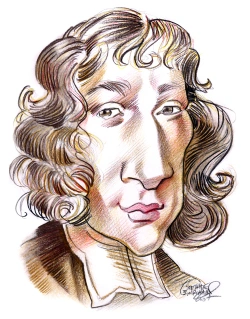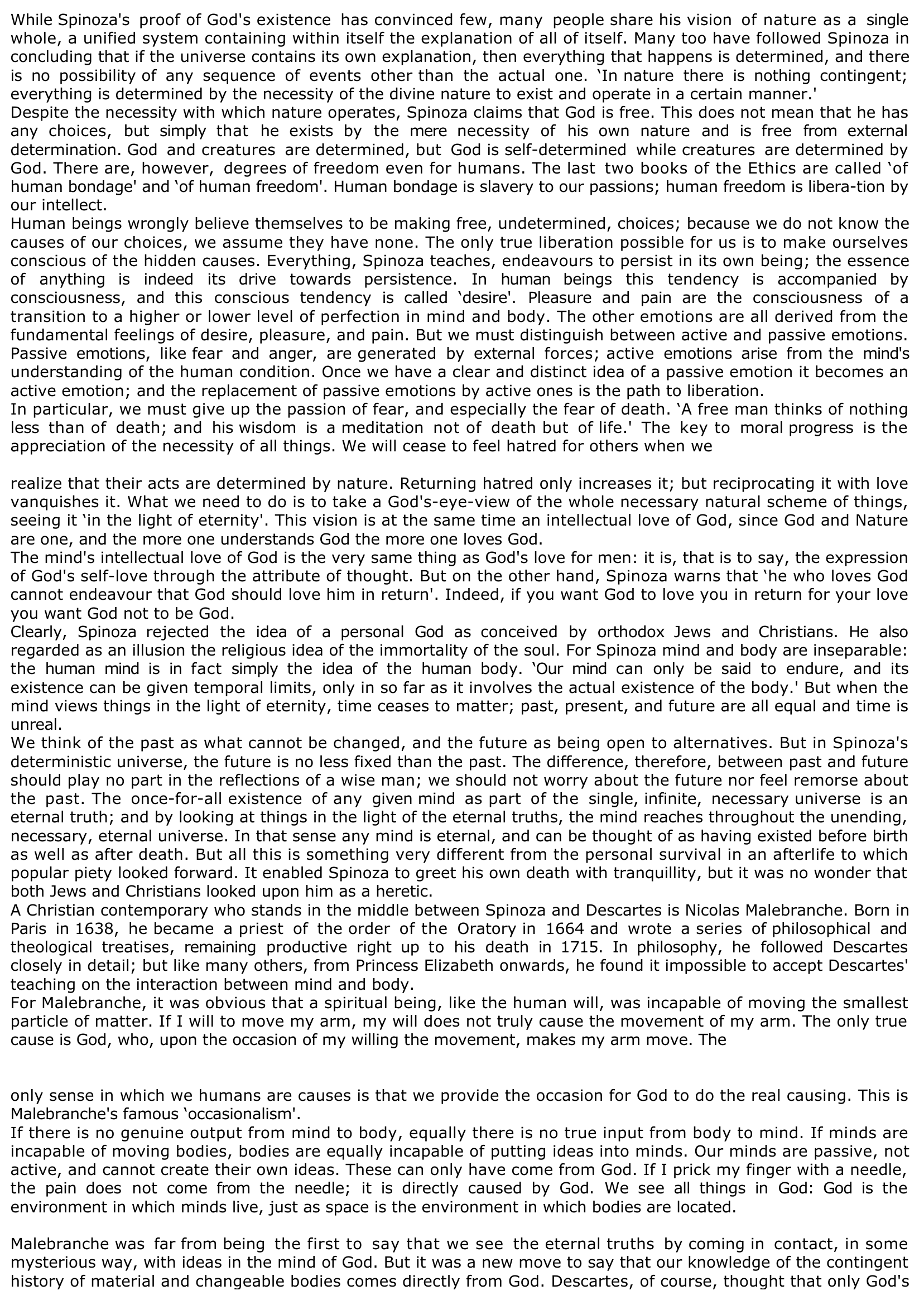Encyclopedia of Philosophy: Spinoza and Malebranche
Publié le 09/01/2010
Extrait du document

The most important of Descartes' continental successors was in fact concerned with the relationship between Cartesian philosophy and the God of the Hebrews. Baruch Spinoza was born into a Spanish-speaking Jewish family living in Amsterdam. He was educated as an orthodox Jew, but he early rejected a number of Jewish doctrines, and in 1656, at the age of twenty-four, he was expelled from the synagogue. He earned his living polishing lenses for spectacles and telescopes, first at Amsterdam and later at Leiden and the Hague. He never married and lived the life of a solitary thinker, refusing to accept any academic appointments, though he was offered a chair at Heidelberg and corresponded with a number of savants including Henry Oldenburg, the first Secretary of the Royal Society. He died in 1677 of phthisis, due in part to the inhalation of glass-dust, an occupational hazard for a lens-grinder. Spinoza's first published work – the only one he published under his own name – was a rendering into geometrical form of Descartes' Principles of Philosophy.

«
While Spinoza's proof of God's existence has convinced few, many people share his vision of nature as a singlewhole, a unified system containing within itself the explanation of all of itself.
Many too have followed Spinoza inconcluding that if the universe contains its own explanation, then everything that happens is determined, and thereis no possibility of any sequence of events other than the actual one.
‘In nature there is nothing contingent;everything is determined by the necessity of the divine nature to exist and operate in a certain manner.'Despite the necessity with which nature operates, Spinoza claims that God is free.
This does not mean that he hasany choices, but simply that he exists by the mere necessity of his own nature and is free from externaldetermination.
God and creatures are determined, but God is self-determined while creatures are determined byGod.
There are, however, degrees of freedom even for humans.
The last two books of the Ethics are called ‘ofhuman bondage' and ‘of human freedom'.
Human bondage is slavery to our passions; human freedom is libera-tion byour intellect.Human beings wrongly believe themselves to be making free, undetermined, choices; because we do not know thecauses of our choices, we assume they have none.
The only true liberation possible for us is to make ourselvesconscious of the hidden causes.
Everything, Spinoza teaches, endeavours to persist in its own being; the essenceof anything is indeed its drive towards persistence.
In human beings this tendency is accompanied byconsciousness, and this conscious tendency is called ‘desire'.
Pleasure and pain are the consciousness of atransition to a higher or lower level of perfection in mind and body.
The other emotions are all derived from thefundamental feelings of desire, pleasure, and pain.
But we must distinguish between active and passive emotions.Passive emotions, like fear and anger, are generated by external forces; active emotions arise from the mind'sunderstanding of the human condition.
Once we have a clear and distinct idea of a passive emotion it becomes anactive emotion; and the replacement of passive emotions by active ones is the path to liberation.In particular, we must give up the passion of fear, and especially the fear of death.
‘A free man thinks of nothingless than of death; and his wisdom is a meditation not of death but of life.' The key to moral progress is theappreciation of the necessity of all things.
We will cease to feel hatred for others when we
realize that their acts are determined by nature.
Returning hatred only increases it; but reciprocating it with lovevanquishes it.
What we need to do is to take a God's-eye-view of the whole necessary natural scheme of things,seeing it ‘in the light of eternity'.
This vision is at the same time an intellectual love of God, since God and Natureare one, and the more one understands God the more one loves God.The mind's intellectual love of God is the very same thing as God's love for men: it is, that is to say, the expressionof God's self-love through the attribute of thought.
But on the other hand, Spinoza warns that ‘he who loves Godcannot endeavour that God should love him in return'.
Indeed, if you want God to love you in return for your loveyou want God not to be God.Clearly, Spinoza rejected the idea of a personal God as conceived by orthodox Jews and Christians.
He alsoregarded as an illusion the religious idea of the immortality of the soul.
For Spinoza mind and body are inseparable:the human mind is in fact simply the idea of the human body.
‘Our mind can only be said to endure, and itsexistence can be given temporal limits, only in so far as it involves the actual existence of the body.' But when themind views things in the light of eternity, time ceases to matter; past, present, and future are all equal and time isunreal.We think of the past as what cannot be changed, and the future as being open to alternatives.
But in Spinoza'sdeterministic universe, the future is no less fixed than the past.
The difference, therefore, between past and futureshould play no part in the reflections of a wise man; we should not worry about the future nor feel remorse aboutthe past.
The once-for-all existence of any given mind as part of the single, infinite, necessary universe is aneternal truth; and by looking at things in the light of the eternal truths, the mind reaches throughout the unending,necessary, eternal universe.
In that sense any mind is eternal, and can be thought of as having existed before birthas well as after death.
But all this is something very different from the personal survival in an afterlife to whichpopular piety looked forward.
It enabled Spinoza to greet his own death with tranquillity, but it was no wonder thatboth Jews and Christians looked upon him as a heretic.A Christian contemporary who stands in the middle between Spinoza and Descartes is Nicolas Malebranche.
Born inParis in 1638, he became a priest of the order of the Oratory in 1664 and wrote a series of philosophical andtheological treatises, remaining productive right up to his death in 1715.
In philosophy, he followed Descartesclosely in detail; but like many others, from Princess Elizabeth onwards, he found it impossible to accept Descartes'teaching on the interaction between mind and body.For Malebranche, it was obvious that a spiritual being, like the human will, was incapable of moving the smallestparticle of matter.
If I will to move my arm, my will does not truly cause the movement of my arm.
The only truecause is God, who, upon the occasion of my willing the movement, makes my arm move.
The
only sense in which we humans are causes is that we provide the occasion for God to do the real causing.
This isMalebranche's famous ‘occasionalism'.If there is no genuine output from mind to body, equally there is no true input from body to mind.
If minds areincapable of moving bodies, bodies are equally incapable of putting ideas into minds.
Our minds are passive, notactive, and cannot create their own ideas.
These can only have come from God.
If I prick my finger with a needle,the pain does not come from the needle; it is directly caused by God.
We see all things in God: God is theenvironment in which minds live, just as space is the environment in which bodies are located.
Malebranche was far from being the first to say that we see the eternal truths by coming in contact, in somemysterious way, with ideas in the mind of God.
But it was a new move to say that our knowledge of the contingenthistory of material and changeable bodies comes directly from God.
Descartes, of course, thought that only God's.
»
↓↓↓ APERÇU DU DOCUMENT ↓↓↓
Liens utiles
- Encyclopedia of Philosophy: HYPOTHESES AND SOCIAL LAWS - COMTE
- Encyclopedia of Philosophy: THE CHARACTER AND ORGANIZATION OF THE SCIENCES - COMTE
- Encyclopedia of Philosophy: Bentham and James Mill
- Encyclopedia of Philosophy: AL-R-Z/ AND AL-F-R-B/
- Encyclopedia of Philosophy: The Doubt and the Cogito - DESCARTES


